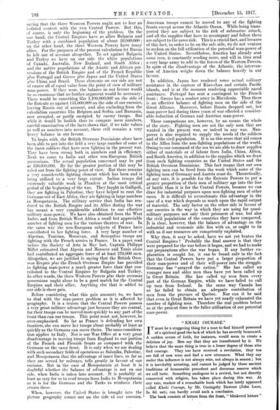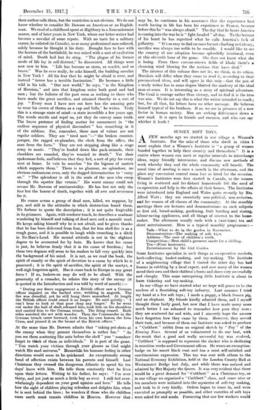" KHAKI COURAGE."
IT must be a staggering thing for a man to find himself possessed of a spiritual good the lack of which he has secretly bemoaned. A sudden access of faith, for instance, would seem to create a delirium of joy. Men say that they are transformed by it. We believe that the same thing is true in a lesser degree of those who find courage. They too have received a revelation, they too are full of new wine and find a new utterance. What they say under this influence is not always wise, not always in season; but it is inevitably arresting, and cannot be judged by those ancient traditions of honourable precedent and decorous reeerve which we call taste. Something analogous to a revival, but not directly connected with nsligion, has taken place during this war. At any rate, readers of a remarkable book which has lately appeared called Khaki Courage, by Mr. Coningsby Dawson (John Lane, 3s. 6d. net), can hardly avoid such a conclusion.
The book consists of letters from the front. blinkered letters"
their author calls them, but the restriction is not obvious. We do not know whether to consider Mr. Dawson an American or an English- man. We read of a childhood spent at Highbury in a Nonconformist manse, and of later years in New York, where our letter-writer had become a novelist of some repute. With no taste for a military career, he enlisted (in Canada), as so many professional men enlisted, solely because he thought it his duty. Brought face to face with the horrors of the battlefield, he was seized with a sort of exaltation of mind. Death had lost its sting. "The plague of his former mode of life lay in self-distrust," he discovered. All thinge were now new to him. "Life has become so stem, so scarlet, and so brave." Was he ever really, he asks himself, the budding novelist in New York! All his fear that he might be afraid is over, and instead "terror has a terrible fascination." He becomes a little wild in his talk. "Our new world," he says, "is the Kingdom of Heroism." and into that kingdom enter both good and bad men ; but the failures of the past seem as nothing to those who have made the great sacrifice, and attained thereby to a sort of joy. "Every man I have met out here has the amazing guts to wear his crown of thorns as a cap and bells," he writes. Truly this is a strange state of mind—a state incredible a few years ago. The words startle and repel us, yet they do convey some truth. The brave pretence of finding matter for amusement in" the endless sequence of physical discomfort" has something in it of the sublime. For, remember, these men of valour are not regular soldiers. They are "tired men "—" the broken counter. jumper, the ragged ex-plumber, the clerk from the office, the man from the farm." They are not stepping along like a stage army to music. "They're loaded down like pack-animals, their shoulders are rounded, they're wearied to death." Yet their spokesman feels, andbelieves that they feel, a sort of pity for every man at home. In vain he searches "for the bigness of motive which supports them." There is no glamour, no splendour, no obvious enthusiasm even, only the dogged determination to "carry on." "The splendour is all in the souls of the men who creep through the squalor like vermin." His worst enemy could not accuse Mr. Dawson of sentimentality. He has lost not only the fear but the horror of death, together with all awe and reverence for it.
He coma across a group of dead men, killed, we suppose, by gas, and still in the attitudes in which destruction found them. We forbear to quote the description ; it is not quite forgivable in its grimness. Again, with tenderer touch, he describes a madman wandering by himself and talking of dead men and a moonlit road. He keeps asking himself why he is not afraid, and he gives thanks that he has been delivered from fear, that for him shell-fire is aa rough game, and it is possible to laugh while crouching in a ditch in No-Man's-Land. His mental attitude is not in the slightest degree to be accounted for by hate. He knows that his cause is just, he believes firmly that it is the cause of freedom ; but these two dogmas will seem to his readers to fall very quickly into the background of his mind. It is not, as we read the book, the spirit of enmity or the spirit of devotion to a cause by which he is possessed ; it is the spirit of sacrifice, the spirit of the martyr, a well-nigh forgotten spirit, Has it come back to Europe in any great force! If so, lookers-on may do well to be afraid. With the generosity of a crusader, he relates this story of the enemy (it is quoted in the Introduction and was told by word of mouth) :—
" During one fierce engagement a British officer saw a German officer impaled on the barbed wire, writhing in anguish. The fire was dreadful, yet he still hung there unscathed. At length the British officer could stand it no longer. He said quietly r I can't bear to look at that poor chap any longer.' So he went out under the hail of shell, released him, took him on his shoulders and carried him to the German trench. The firing ceased. Both sides watched the act with wonder. Then the Commander in the German trench came forward, took from his own bosom the Iron Cross, and pinned it on the breast of tho British officer."
At the same time Mr. Daweon admits that "taking pot-shots at the enemy when they present themselves is rather fun." "As you see them scattering like ants before the shell" you "somehow forget to think of them as individuals." It is part of the game. "You watch your victims through your glasses as God might watch His mad universe." Meanwhile his humane feeling in other directions would seem to be quickened. An exceptionally strong bond of affection exists between his parents and himself. Last Christmas they crossed the dangerous Atlantic to spend his ten days' leave with him. He tells them constantly that he lives upon their letters. Writing to his father, he says : "I'm over thirty, and yet just as much a little boy as ever. I still feel over- whelmingly dependent on your good opinion and love." He tells how the sight of children playing refreshes and delights him when he is sent behind the lines ; he wonders if those who die childless neon earth must remain childless in Heaven. However that may be, he continues in his assurance that the experience best worth having in life has been his experience in France, because before this he " was always afraid." The day that he hears America is coming into the war he is" light-headed "all day. To the bottom of his heart he has regretted what he calls America's lack of gallantry. "It's so easy to find excuses for not climbing to Calvary, sacrifice was always too noble to be sensible. I would like to sea the country of our adoption become splendidly irrational, even at this eleventh hour of the game. She does not know what she is losing. From these carcase-strewn fields of khaki there's a cleansing wind blowing for the nations that have died."
The interest of this volume does not lie, we think, in its ethics. Moralists will differ when they come to read it, according to their preconceived ideas, and will agree in this only—that the pen of a ready writer has in some degree blotted the modesty of the ideal man-at-arms. It is interesting as a story of spiritual adventure. The Grail is courage rather than victory, and to find it is the true war aim. We do not say this is what the writer intended to leach; but, for all that, his letters have no other message. He believes himself typical of his brethren. If so, we are in presence of a new fatter in human society. Men are seeking deliverance down new road. It is open to friends and enemies, and who can say whither it leads ?



































 Previous page
Previous page